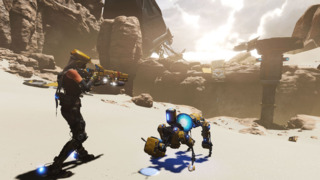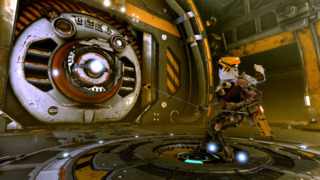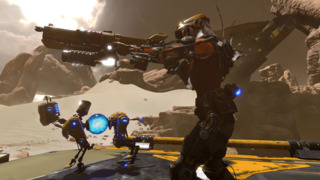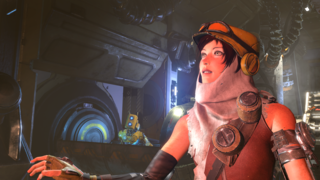ReCore is one of the most frustrating games I've played in a long time, and not because it's overly difficult. Here's this charming marriage of Japanese and Western design philosophies--mixing fast-paced platforming and cutesy robots with pretty deep RPG-style crafting and customization, respectively--tied together with a story about saving the human race that initially rises above your typical video game cliché. ReCore offers a lighthearted, fun first few hours, but all that promise is quickly buried in a torrent of bugs and oversights, poor storytelling, and disjointed pacing that all make the game a pale shadow of what it could have been.

Joule is one of a handful of maintenance workers on a desert world called Far Eden, cryosleeping away the decades while an army of "corebots" terraforms the planet into a lush garden world suitable for the remnants of a plague-riddled humanity to settle on. The rest of the people are also in stasis aboard ships in orbit, as far as Joule knows, but she wakes up way past the terraforming deadline to find Far Eden is still an arid waste and most of the corebots have been up to no good. Joule and her trio of friendly robotic helpers set out to try to get the planet-building gear back up and running, and figure out what's going on with all those bad bots. Joule's robot buddies are endearing as all heck, and even with no discernible dialog they show a ton of personality just through their body language. But there aren't really any other meaningful players in the story, nor any significant story development at all. Along the way there are a couple of intriguing revelations about the terraforming effort and the state of affairs back on Earth, and the idea of robots rebelling against their creators and dooming humanity's last hope in the process is interesting on its face, but the game so profoundly fails to reach a satisfying conclusion about any of this that, having finished ReCore, looking back on the game's initial premise just makes me feel sad.
But let's focus on the good, first. The action at least comes together more fully than the story, and it's built out of some great parts. With a hard lock-on that takes care of all your targeting, this isn't a third-person shooter in the traditional sense; instead, the combat is all about evading the enemies' widely varied attacks via a double jump and air dash while you flip between targets. Those enemies come in red, blue, and yellow variants, each with their own types of attacks, and you'll need to vary the color of your own damage output accordingly to take them down quickly. You'll also have two of your three robotic buddies--Mack the dog, Seth the spider, and Duncan the ape--with you at any time, and these guys also have color-coding and unique attacks that you'll have to manage on the fly in the middle of hectic firefights. Whittling enemies down allows you to extract their AI "core," which you can use to buff your buddies' stats, or you can opt to just destroy your foes outright to gain other crafting materials, depending on what you need at the moment. The combat has enough different things going on fast enough that it requires a lot of fun, quick decision-making and rarely wears out its welcome.

There's a nice layer of RPG-style progression on top of the combat that keeps you upgrading pretty steadily. Joule and her robot buddies gain experience and level up as you fight, and you'll collect dozens of blueprints that let you craft new gear for each friendly robot that buffs their stats and gives them new bonuses and a new look. Later on, you can even swap the robots' AI cores between the three existing frames (and a fourth flying one you find later on), all of which unlocks new special attacks and lets you micromanage stats and abilities to a satisfying degree. The combat never becomes too terribly difficult outside of a handful of unfortunate difficulty spikes in the second half of the game, but it's still a lot of fun to maximize your combat options and damage output and try to collect more and better blueprints.
ReCore's structure is a bit like a 3D Zelda game, in that you have a series of overworld maps with a few things to do here and there, and a variety of story and side dungeons you load into where the heavier combat and puzzle-solving take place. At first this seems like a nice way to mix up what you're doing: finish a story dungeon to advance the plot, roam around and collect some stuff for a bit, pop into a side dungeon (which come in puzzle, platforming, and arena-combat flavors), then repeat. Your access to all of this stuff is gated by the number of prismatic cores--an item sort of analogous to Mario 64's stars--you've managed to collect via story and overworld means, and you can see on the map how many cores and which robot buddies you need to enter a given dungeon, along with the recommended character level.
All of the gameplay design elements in ReCore collectively have the makings of an excellent little character-driven action game like there haven't been enough of in recent years. The combat is fast and varied, the platforming is demanding and cleverly designed, and the progression has more than enough of that carrot-on-a-stick potential to make you want to keep upgrading. But the longer the game goes on, the more bugs large and small start to grate on your nerves, and the more disjointed and downright weird the pacing of the story becomes. I eventually lost track of the number of technical issues I ran into playing through this game; it's simply one of the buggiest games to come out of a major publisher, much less a platform-holder, in recent memory.

Some parts of the game world have no collision, so you'll fall right through them. Other parts, presumably where the designers didn't want you to go but which look completely innocent, kill you with invisible "radiation" in seconds. The fast travel system broke on me at least half a dozen times, forcing me to restart the game entirely. I had dialogue from earlier missions trigger again in later missions hours after I'd heard it the first time. Similarly, while fighting my way through the game's last dungeon, my mission objective reverted to one from the very beginning of the game. Every aspect of the game I can think of--animation, sound, menus, mission logic and scripting, interactions with the environment--had things break or go sideways at one point or another. One of the late-game dungeons has a high likelihood of dumping you into an infinite-respawn loop if you so much as die in it once. I say the likelihood is high because I got it to happen four separate times across the Xbox One and PC versions of the game. It's enough to make you question how a game even goes out the door like this.
The short length and awful pacing of the game are arguably worse than the bugs, if that's possible. The story unfolds at a natural clip for the first six hours or so, but right around the time you feel like the end of act one has arrived and you're about to see the story open up and learn about the antagonist's motivations, you realize you're actually more or less at the end of the game. The villain spends a grand total of about two minutes onscreen and is referenced by Joule even less before you find yourself slamming headfirst into ReCore's tedious grind of an endgame. Where's the second and most of the third acts here? Past the first four or five hours, the dramatic arc just dissolves and it feels like you're being hurried along to the perfunctory final encounter... except you can't just go finish the game, because the final dungeon drops a sequence of increasingly onerous prismatic core requirements on you as you try to work your way through it. You won't have anywhere close to enough cores to advance through that final dungeon when you get there, and every floor adds another five to the tally, so you'll repeatedly have to go back out into the world and scour the remaining side content for more of the damn things.
And then, again, there's the lack of story, and the feeling that huge chunks of it are just missing, as the game grinds on. By the time you get to that final dungeon, something like a fifth of the game's total landmass will remain completely untouched; it's purely there for you to go poke around in, looking for cores, at the end. A couple of the cutscenes are so shoddily put together, with disjointed scene transitions and rushed exposition and some really ugly FMV, that I found myself confused as to what had just happened after they were over. Almost all of the actually interesting storytelling is relegated to audio logs and text notes, which actually give you some background on the architects of the terraforming project and what may have gone wrong. But those plot elements feel like they were written to serve a much grander storyline that just isn't here at all. Once you finally reach the final boss fight (which is just a retread of a fight you fought hours earlier), you're treated to one of the most slapped-together jokes of an ending I've ever seen in a game. After one briefly heartfelt dialogue sequence that doesn't actually address any of the open questions of the plot, you get a couple of what feel like placeholder cutscenes that were shoved into the ending, and then you're wordlessly dumped back to the title screen without even a credits roll. I won't pretend to know what did or didn't happen in the course of this game's development, but between the bugs and the lack of storytelling, it's hard not to feel like this thing needed quite a bit more time in the oven.

Setting aside the quality of the game, ReCore at least serves as an encouraging start for Microsoft's "Play Anywhere" initiative that will get you access to both Xbox One and Windows 10 versions of all first-party games from now on. In contrast to the much-maligned Games for Windows Live, it was a cinch to download ReCore and launch it from the Start menu, no extra login or overlay nonsense required. The game ran beautifully on PC, detected my Xbox One controller, unlocked the same achievements (although I never got any notifications for them), automatically switched to headphones when I plugged them into the controller's headphone jack; it pretty much delivered the seamless convenience of a console once I was in-game. The game's incredibly long loading times and shoddy frame rate on Xbox One make the PC version your best bet if you have a decent system, actually. It's too bad Microsoft couldn't manage to launch this effort with a more complete game than ReCore, although this positive first experience bodes exceedingly well for Forza Horizon 3 and Gears of War 4 in a few weeks.
It would be so much easier to dismiss ReCore if it were just a bad game in every respect, but the sad reality is that taken individually, every one of the game's design elements shows thoughtfulness and craft. The combat, platforming, crafting and customization, even the parts of the story that work were clearly built with care and seem like they'll amount to a really engaging game with a lovable cast of characters and an intriguing world, but the game's rampant problems are just impossible to look past. This game deserved to be so much more.